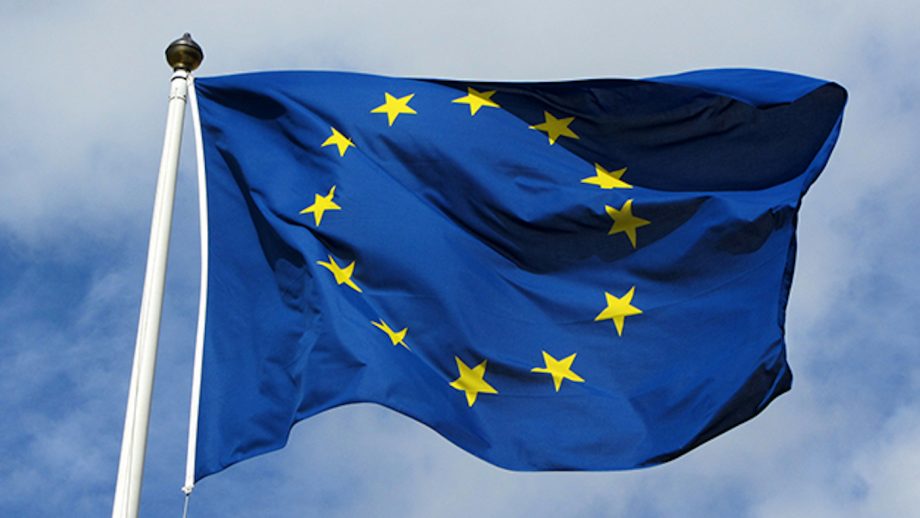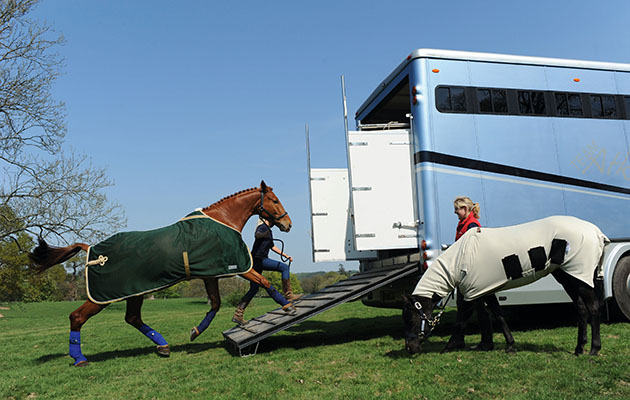New rules came into force affecting anyone transporting horses from the UK to EU on 1 January. H&H speaks to those affected, and those working hard to clarify what these mean in real terms
WORK to untangle the new rules that have come to light now Britain has left the EU is ongoing, as those moving horses abroad seek clarity on requirements.
The Brexit transition period ended on 31 December, but certain essential documents could not be obtained before the end of 2020, as Britain was still a member of the EU. On 1 January, certain UK documentation was no longer recognised by EU states.
{"content":"PHA+VGhlIGZ1bGwgZXh0ZW50IG9mIHdobyB0aGUgbmV3IHJ1bGVzIHdpbGwgYXBwbHkgdG8gaXMgdG8gYmUgY2xhcmlmaWVkLCBpbiB0ZXJtcyBvZiBwcml2YXRlIGJveGVzIGFuZCB0cmFuc3BvcnRpbmcgZm9yIGJ1c2luZXNzLCBidXQgdGhleSBkbyBhcHBseSB0byB0cmFuc3BvcnQgY29tcGFuaWVzLjwvcD4KPHA+RnJlZCBQYXJrZXIsIG9mIEpvaG4gUGFya2VyIEludGVybmF0aW9uYWwgSG9yc2UgVHJhbnNwb3J0LCBzcG9rZSB0byA8ZW0+SCZhbXA7SDwvZW0+IG9uIE1vbmRheSAoMTEgSmFudWFyeSkgYXMgaGUgcHJlcGFyZWQgdG8gc2VuZCBzaXggZW1wdHkgYm94ZXMgdG8gQmVsZ2l1bSB0byBvYnRhaW4gdGhlIGFwcHJvdmFsIGNlcnRpZmljYXRlcyBVSyB0cnVja3MgbmVlZCB0byB0cmFuc3BvcnQgaG9yc2VzIGZvciBidXNpbmVzcyBpbiB0aGUgRVUuPC9wPgo8cD7igJxXZSBjb3VsZG7igJl0IGRvIHRoYXQgYmVmb3JlIDEgSmFudWFyeSBhcyBCcml0YWluIHdhcyBzdGlsbCBhbiBFVSBjb3VudHJ5LiBJZiB3ZSBjb3VsZCBoYXZlIGRvbmUgaXQgYmVmb3JlLCB3ZSBhcmUgdGhlcmUgZXZlcnkgd2VlayBhbmQgY291bGQgZWFzaWx5IGhhdmUgYXJyYW5nZWQgZm9yIGNoZWNrcyB0byBiZSBkb25lIHRoZW4s4oCdIHNhaWQgTXIgUGFya2VyLCBhZGRpbmcgdGhhdCBhIOKAnGNvbnNlcnZhdGl2ZSBlc3RpbWF0ZeKAnSBwdXRzIHRoZSBjb3N0IGFyb3VuZCDCozEsNTAwIHBlciBib3guPC9wPgo8cD48ZGl2IGNsYXNzPSJhZC1jb250YWluZXIgYWQtY29udGFpbmVyLS1tb2JpbGUiPjxkaXYgaWQ9InBvc3QtaW5saW5lLTIiIGNsYXNzPSJpcGMtYWR2ZXJ0Ij48L2Rpdj48L2Rpdj48c2VjdGlvbiBpZD0iZW1iZWRfY29kZS0zMSIgY2xhc3M9ImhpZGRlbi1tZCBoaWRkZW4tbGcgcy1jb250YWluZXIgc3RpY2t5LWFuY2hvciBoaWRlLXdpZGdldC10aXRsZSB3aWRnZXRfZW1iZWRfY29kZSBwcmVtaXVtX2lubGluZV8yIj48c2VjdGlvbiBjbGFzcz0icy1jb250YWluZXIgbGlzdGluZy0tc2luZ2xlIGxpc3RpbmctLXNpbmdsZS1zaGFyZXRocm91Z2ggaW1hZ2UtYXNwZWN0LWxhbmRzY2FwZSBkZWZhdWx0IHNoYXJldGhyb3VnaC1hZCBzaGFyZXRocm91Z2gtYWQtaGlkZGVuIj4NCiAgPGRpdiBjbGFzcz0icy1jb250YWluZXJfX2lubmVyIj4NCiAgICA8dWw+DQogICAgICA8bGkgaWQ9Im5hdGl2ZS1jb250ZW50LW1vYmlsZSIgY2xhc3M9Imxpc3RpbmctaXRlbSI+DQogICAgICA8L2xpPg0KICAgIDwvdWw+DQogIDwvZGl2Pg0KPC9zZWN0aW9uPjwvc2VjdGlvbj48L3A+CjxwPlRoZSBjb21wYW554oCZcyBmaXJzdCBwb3N0LUJyZXhpdCBleHBvcnQgd2FzIG9uIDggSmFudWFyeSDigJMgdXNpbmcgYSBEdXRjaCB2ZWhpY2xlIHdpdGggaG9yc2VzIGhlYWRpbmcgdG8ganVtcCBpbiBTcGFpbiDigJMgdG8gdGVzdCBib3JkZXIgY29udHJvbCBwcm9jZWR1cmVzLCB3aGljaCB3ZW50IHNtb290aGx5LiBUaGUgY29tcGFueSwgd2hpY2ggaGFzIGJlZW4gb3BlcmF0aW5nIHNpbmNlIDE5NzcsIGhhcyBodWdlIGV4cGVyaWVuY2UgaW4gZGVhbGluZyB3aXRoIGltcG9ydCBhbmQgZXhwb3J0IHJlcXVpcmVtZW50cyBmb3IgZGlmZmVyZW50IGNvdW50cmllcywgd2hpY2ggTXIgUGFya2VyIHNhaWQgYXJlIG5vdCBhIHByb2JsZW0uPC9wPgo8cD5BbiBpc3N1ZSBpcyB0aGUgbGFjayBvZiBjbGFyaXR5IGFuZCBjb25zaXN0ZW5jeSwgd2hpY2ggaGUgaG9wZXMgd2lsbCBiZSByZXNvbHZlZCBxdWlja2x5LjwvcD4KPHA+4oCcV2UganVzdCB3YW50IHNvbWVib2R5IHRvIHNheSwg4oCYUmlnaHQsIHRoaXMgaXMgd2hhdCB5b3UgbmVlZCB0byBkbyzigJkgdGhlbiBldmVyeW9uZSBjYW4ganVzdCBnZXQgb24gYW5kIGRvIGl0LOKAnSBoZSBhZGRlZC48L3A+CjxkaXYgY2xhc3M9ImFkLWNvbnRhaW5lciBhZC1jb250YWluZXItLW1vYmlsZSI+PGRpdiBpZD0icG9zdC1pbmxpbmUtMyIgY2xhc3M9ImlwYy1hZHZlcnQiPjwvZGl2PjwvZGl2Pgo8cD5UaGUgY29tcGFueSBpcyBmaWVsZGluZyBlbnF1aXJpZXMgZm9yIGhvcnNlcyBoZWFkaW5nIHRvIHRoZSBTcGFuaXNoIHNob3dqdW1waW5nIHRvdXJzLCB3aG9zZSByaWRlcnMgYXJlIHBsYW5uaW5nIHRvIGRyaXZlIG91dCBzZXBhcmF0ZWx5IGluIHRoZWlyIG93biwgZW1wdHkgbG9ycmllcywgdG8gZ2V0IHRoZSB2ZWhpY2xlIGFwcHJvdmFsIHNvIHRoZXkgY2FuIG1vdmUgaG9yc2VzIGFicm9hZCB0aGVtc2VsdmVzIGluIGZ1dHVyZS48L3A+CjxwPk5lZ290aWF0aW9ucyBhcmUgY29udGludWluZywgd2l0aCBpbnZvbHZlbWVudCBmcm9tIDxhIGhyZWY9Imh0dHBzOi8vd3d3LmhvcnNlYW5kaG91bmQuY28udWsvdGFnL2RlZnJhIj5EZWZyYTwvYT4sIDxhIGhyZWY9Imh0dHBzOi8vd3d3LmhvcnNlYW5kaG91bmQuY28udWsvdGFnL2JyaXRpc2gtZXF1ZXN0cmlhbi1mZWRlcmF0aW9uIj5Ccml0aXNoIEVxdWVzdHJpYW4sPC9hPiB0aGUgQnJpdGlzaCBIb3JzZXJhY2luZyBBdXRob3JpdHksIHRoZSBUaG9yb3VnaGJyZWQgQnJlZWRlcnMgQXNzb2NpYXRpb24gYW5kIHRoZSBCcml0aXNoIEhvcnNlIENvdW5jaWwsIGFuZCB0aGUgc2l0dWF0aW9uIGlzIGNoYW5naW5nIHJhcGlkbHkuPC9wPgo8ZGl2IGNsYXNzPSJhZC1jb250YWluZXIgYWQtY29udGFpbmVyLS1tb2JpbGUiPjxkaXYgaWQ9InBvc3QtaW5saW5lLTQiIGNsYXNzPSJpcGMtYWR2ZXJ0Ij48L2Rpdj48L2Rpdj4KPHA+PGEgaHJlZj0iaHR0cHM6Ly93d3cuaG9yc2VhbmRob3VuZC5jby51ay90YWcvdGhlLWhvcnNlLXRydXN0Ij5Ib3JzZSBUcnVzdDwvYT4gZGlyZWN0b3Igb2YgcmVzZWFyY2ggYW5kIHBvbGljeSBKYW4gUm9nZXJzLCB3aG8gaXMgYW1vbmcgdGhvc2Ugd29ya2luZyB0byB1bnBpY2sgdGhlIHNpdHVhdGlvbiBhcyBxdWlja2x5IGFzIHBvc3NpYmxlLCB0b2xkIDxlbT5IJmFtcDtIPC9lbT4gb24gOCBKYW51YXJ5IHRoYXQgdGhleSBoYXZlIG1vcmUgYW5zd2VycyBhbmQgYXJlIGluIGEgYmV0dGVyIHBvc2l0aW9uIHRvIHNwZWFrIHRvIHRoZWlyIEVVIGNvdW50ZXJwYXJ0cyBzaW5jZSB0aGUgRVUgKEZ1dHVyZSBSZWxhdGlvbnNoaXApIEJpbGwgd2FzIHNpZ25lZCBvbiAzMCBEZWNlbWJlci48L3A+CjxwPuKAnFRoZSBiaWdnZXN0IG91dHN0YW5kaW5nIG1hdHRlciBpcyBtdXR1YWwgcmVjb2duaXRpb24gb2YgdmVoaWNsZSBhbmQgdHJhbnNwb3J0ZXIgYXV0aG9yaXNhdGlvbiBhbmQgY2VydGlmaWNhdGVzIG9mIHByb2Zlc3Npb25hbCBjb21wZXRlbmNlIFtDUENdLCBhbHRob3VnaCBzb21lIHByb3ZpZGVycyBpbiBJcmVsYW5kIGFuZCBCZWxnaXVtIG5vdyBvZmZlciBvbmxpbmUgQ1BDIHRyYWluaW5nLOKAnSBzaGUgc2FpZC48L3A+CjxkaXYgY2xhc3M9ImFkLWNvbnRhaW5lciBhZC1jb250YWluZXItLW1vYmlsZSI+PGRpdiBpZD0icG9zdC1pbmxpbmUtNSIgY2xhc3M9ImlwYy1hZHZlcnQiPjwvZGl2PjwvZGl2Pgo8cD5TaGUgc3RyZXNzZWQgdGhhdCBuZWdvdGlhdGlvbnMgbWVhbiB0aGUgc2l0dWF0aW9uIGlzIGNvbnN0YW50bHkgY2hhbmdpbmcsIGFuZCB0aGUgYm9kaWVzIGFib3ZlIGFyZSB3b3JraW5nIHdpdGggdGhlIEZFSSBhbmQgSW50ZXJuYXRpb25hbCBIb3JzZSBTcG9ydHMgQ29uZmVkZXJhdGlvbiB0byBzZWVrIHRvIHNlY3VyZSBzaG9ydCBhbmQgbG9uZ2VyLXRlcm0gc29sdXRpb25zIGZvciB2ZWhpY2xlIGFuZCB0cmFuc3BvcnRlciBhdXRob3Jpc2F0aW9uIGluIHRoZSBlcXVpbmUgc2VjdG9yIGFzIHNvb24gYXMgcG9zc2libGUuPC9wPgo8cD5NcyBSb2dlcnMgYWRkZWQgb24gMTEgSmFudWFyeSB0aGF0IERlZnJhIGhhcyBhZHZpc2VkIHRoZXJlIGlzIG5vIGRpc3BlbnNhdGlvbiBwbGFubmVkIGZvciB0aGUgcnVsZXMgb24gdHJhbnNwb3J0ZXIgYXV0aG9yaXNhdGlvbiwgYW5kIHRob3NlIGludm9sdmVkIGFyZSBmb2N1c2luZyBvbiBob3cgdGhpcyBjYW4gYmUgYWNoaWV2ZWQsIGZvciBVSyB0cmFuc3BvcnRlcnMgb2YgZGlmZmVyZW50IHNpemVzLiBUaGlzIG1lYW5zIEJyaXRpc2ggdHJhbnNwb3J0ZXJzIG5lZWQgdG8gYXBwbHkgZm9yIEVVIGF1dGhvcmlzYXRpb25zLCBhbmQgdmljZSB2ZXJzYS48L3A+CjxwPk5ld3Mgb2YgRXVyb3R1bm5lbCBwcmljZSBoaWtlcyBoYXZlIGJlZW4gY2lyY3VsYXRpbmcgb24gc29jaWFsIG1lZGlhLiA8ZW0+SCZhbXA7SDwvZW0+IHB1dCB0aGUgY2xhaW1zIG9mIGFuIGluY3JlYXNlIGluIGZhcmVzIGZvciBob3JzZWJveGVzIHRyYXZlbGxpbmcgdmlhIEV1cm90dW5uZWwgYW5kIGEgbmV3IMKjMzI1L2hvcnNlIHN1cmNoYXJnZSB0byB0aGUgY29tcGFueS48L3A+CjxwPkEgc3Bva2VzbWFuIGNvbmZpcm1lZCB0aGUgRm9sa2VzdG9uZSB0byBDYWxhaXMgaW5jcmVhc2UsIHN0YXRpbmcgdGhhdCBuZXcgdmV0IGNvbnRyb2xzIGFyZSBub3cgcmVxdWlyZWQgb24gZXF1aW5lcyBlbnRlcmluZyB0aGUgRVUgZnJvbSB0aGUgVUsuPC9wPgo8cD7igJxDb25zZXF1ZW50bHksIHRvIHByb3ZpZGUgYW4gZXF1aXZhbGVudCBzZXJ2aWNlIHRvIHRoYXQgb2ZmZXJlZCBpbiB0aGUgcGFzdCwgRXVyb3R1bm5lbCBoYXMgaGFkIHRvIGJ1aWxkIG5ldyBpbmZyYXN0cnVjdHVyZSB0byBhY2NvbW1vZGF0ZSB2ZXRlcmluYXJ5IGNvbnRyb2xzLOKAnSBoZSBzYWlkLiDigJxXZSBhcmUgY29udmluY2VkIHRoZSBwcm9jZXNzIGFuZCBmYWNpbGl0aWVzIHdpbGwgcHJvdmlkZSB0aGUgYmVzdCBwb3NzaWJsZSBjb25kaXRpb25zIGZvciBlcXVpbmUgdHJhbnNwb3J0IHVuZGVyIHRoZSBuZXcgYXJyYW5nZW1lbnRzLuKAnTwvcD4KPGgzPkluc3VyYW5jZSBjb25jZXJuczwvaDM+CjxwPkFOWU9ORSB0cmF2ZWxsaW5nIGFicm9hZCB3aXRoIGhvcnNlcywgZm9yIGJ1c2luZXNzIG9yIG90aGVyd2lzZSwgaXMgc3Ryb25nbHkgYWR2aXNlZCB0byBjaGVjayB3aXRoIHRoZWlyIGluc3VyZXJzIHdlbGwgaW4gYWR2YW5jZS48L3A+CjxwPlRoaXMgbXVzdCBiZSBkb25lIGFueXdheSBmb3IgZHJpdmVycyB0byBvYnRhaW4gYSBncmVlbiBjYXJkLCBwcm9vZiB0aGV5IGhhdmUgdGhlIG1pbmltdW0gaW5zdXJhbmNlIGNvdmVyIHJlcXVpcmVkIGJ5IHRoZSBjb3VudHJ5IHRoZXkgYXJlIGRyaXZpbmcgaW4uPC9wPgo8ZGl2IGNsYXNzPSJpbmplY3Rpb24iPjwvZGl2Pgo8cD5UaGVyZSBpcyBwb3NpdGl2ZSBuZXdzIHRoYXQgdGhlIEV1cm9wZWFuIGhlYWx0aCBpbnN1cmFuY2UgY2FyZCAoRUhJQykgaGFzIGJlZW4gcmVwbGFjZWQgd2l0aCB0aGUgZ2xvYmFsIGhlYWx0aCBpbnN1cmFuY2UgY2FyZCAoR0hJQyksIHdoaWNoIG1lYW5zIGhvbGRlcnMgd2lsbCBzdGlsbCBiZSB0cmVhdGVkIGluIHRoZSBFVSBpbiBhIG1lZGljYWwgZW1lcmdlbmN5LCBidXQgdGhpcyBpcyBub3QgYSBzdWJzdGl0dXRlIGZvciB2YWxpZCBpbnN1cmFuY2UuPC9wPgo8cD5UaGUgcGFuZGVtaWMsIEZvcmVpZ24gT2ZmaWNlIGFkdmljZSBhbmQgcnVsZXMgb2YgdGhlIGNvdW50cnkgeW91IGFyZSBpbiBtYXkgYWxzbyBpbXBhY3Qgb24gaW5zdXJhbmNlIHZhbGlkaXR5LiBBbnlvbmUgdHJhdmVsbGluZyBmb3IgZXNzZW50aWFsIHJlYXNvbnMgc2hvdWxkIGNoZWNrIEZvcmVpZ24gT2ZmaWNlIGFkdmljZSBhbmQgd2l0aCBpbnN1cmVycyBiZWZvcmVoYW5kLjwvcD4KPHA+Cg=="}
You might also be interested in…
Library image
A Defra webinar on 4 November explained in detail the steps anyone taking horses from Britain to EU member states
Library image.
Credit: Lucy Merrell
There had been uncertainty over whether the EU would recognise British studbooks
A step forward has been taken to help secure the seamless travel of horses between Britain and EU member states
Library image.
Credit: www.timeincukcontent.com
A ‘digital passport’ for horses has been put forward as a solution to help smooth cross-border travel continue for competition,
Library image.
Credit: Lucy Merrell
The group leading racing’s Brexit preparations has advised the industry not to move horses to and from the EU ‘unless
Stay in touch with all the news in the run-up to and throughout the major shows and events during 2026 and beyond with a Horse & Hound subscription. Subscribe today for all you need to know ahead of these major events, plus online reports on the action as it happens from our expert team of reporters and in-depth analysis in our special commemorative magazines. Have a subscription already? Set up your unlimited website access now
H&H senior news writer
Lucy is an experienced news journalist, reporter and presenter. Since joining the Horse & Hound team in 2015, Lucy has reported from major global sporting events including the Tokyo Paralympic Games and multiple European Championships, as well as Badminton, Burghley and London, to name a few. She has covered current affairs and sports news across the full spectrum of equestrian disciplines and racing, as well as human and equine welfare, industry news and court cases.






